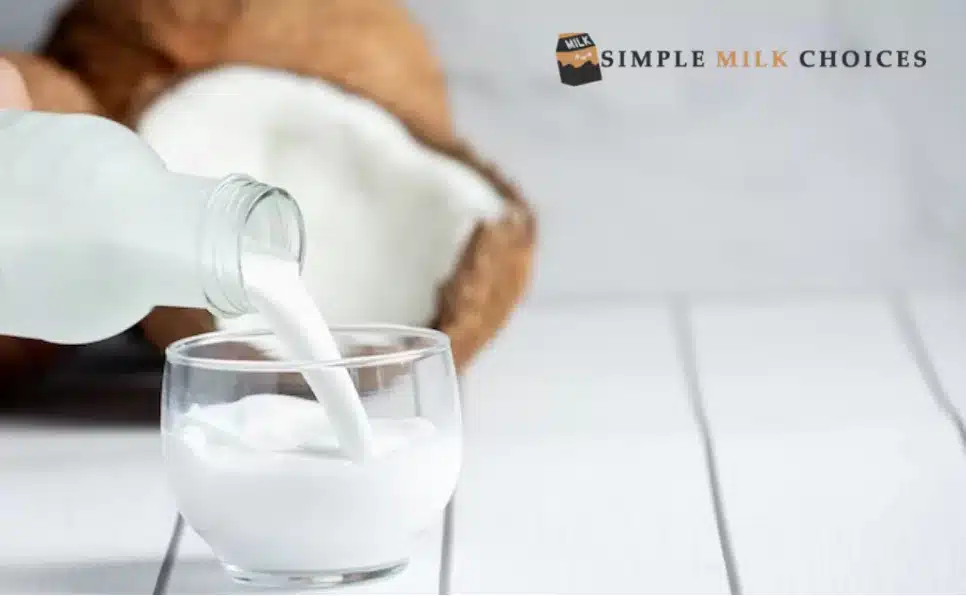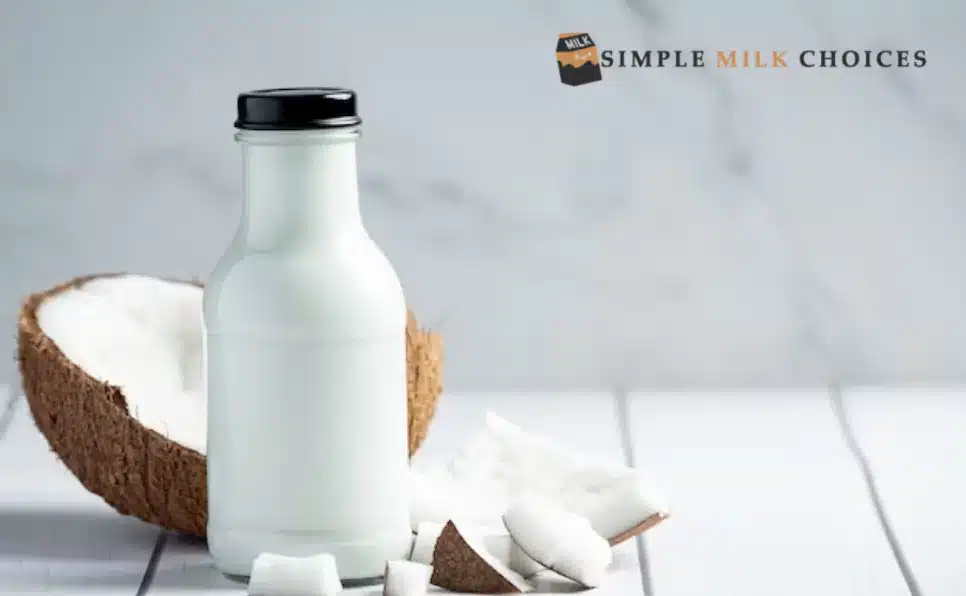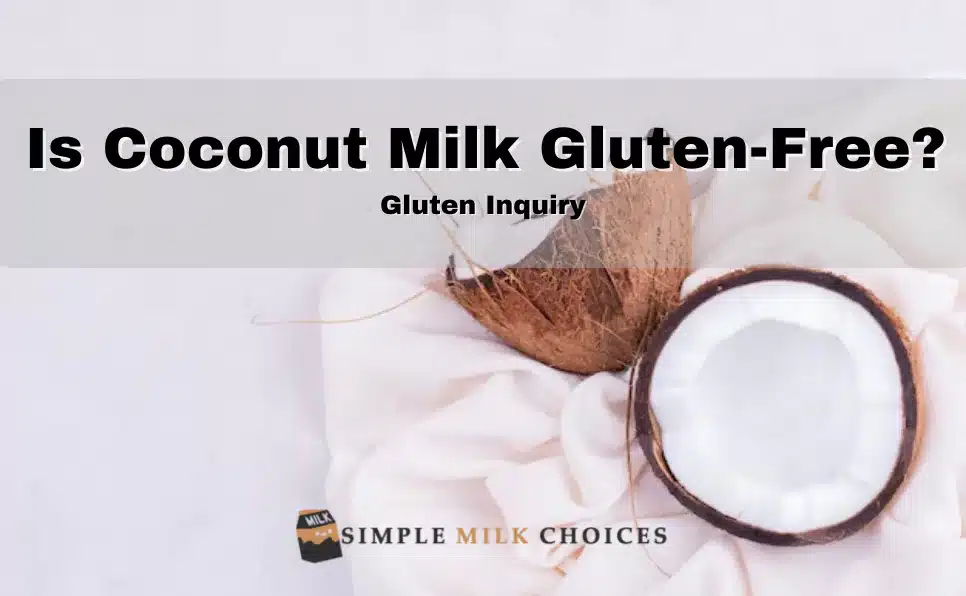Coconut milk has turned into a popular choice for some people, especially those with dietary limitations. Gluten is like a sneaky ingredient hiding in certain foods. It’s a protein tracked down in wheat, grain, and rye. Some people feel sick when they eat gluten, especially those with celiac disease or gluten sensitivity.
Introducing Coconut Milk to You
Imagine that you have a coconut—one of those big, brown, hairy fruits. Inside, there’s a hard shell and some yummy white stuff called coconut meat. This white portion is mixed with water. After that, they thoroughly squeeze and press it to extract the milk. Coconut milk is that!
Making Coconut Milk
In the first place, people remove the white part of the coconut and blend it with water. Then, at that point, they crush it a great deal, such as giving it a major embrace, to get all the smooth fluid out. We refer to this liquid as coconut milk! It doesn’t come from cows but from coconuts.
Why is coconut milk so popular? Coconut milk has a pleasant tropical flavor and a slightly sweet taste. A few people use it for cooking to make yummy dishes like curries or rich sauces. Others use it in their grains or smoothies since it adds a delectable twist!
Is Coconut Milk Natural?
Yes, coconut milk is regular! It comes right from the actual coconut. That means it has no strange things added to it, simply the goodness of the coconut.
What Can be said about the Gluten in Coconut Milk?
Coconut milk is normally gluten-free! In this way, for people who can’t have gluten in their food, coconut milk is often a great choice.
Why It's a Cool Drink?
Aside from being gluten-free, coconut milk has a few beneficial effects on our bodies. It has solid fats and a few nutrients, which resemble little partners for our bodies to use as major areas of strength. Much more, you can freeze the leftover coconut milk.
In a Nutshell
Coconut milk is a delectable fluid produced by crushing a white piece of coconut and blending it with water. It’s normal and it doesn’t have gluten in it. Because it tastes delicious and is good for you, people like to drink and cook with it.
The Big Question: Is Coconut Milk Naturally Gluten-Free?
Consider coconut milk as a coconut-based drink. Because these coconuts don’t naturally contain gluten, the milk they make is safe for people who can’t eat gluten.
When something is “without gluten,” it means it doesn’t have any of that tricky gluten inside. Since coconuts themselves don’t contain gluten, the milk they make from them is generally suitable for people who need to stay away from gluten.
Tricky Situations: How Gluten Might Sneak into Coconut Milk?
Where they make coconut milk, they could also make different things, like stuff with wheat or grain. These things have gluten. Now imagine traces of gluten accidentally finding their way into the coconut milk. It resembles when scraps from one food unintentionally fall into another!
The Subtle Piece
Even though coconuts themselves don’t have gluten, the machines or where they make coconut milk could have gluten from different food sources. Therefore, coconut milk that is produced in the same location or using the same equipment may contain this gluten.
Why it's Important?
For those who can’t eat gluten, even a small amount can make them sick. Along these lines, it’s essential to be aware assuming there may be any gluten in things like coconut milk, regardless of whether it seems like there shouldn’t be.
Checking for Health
That is the reason it’s wise to search for marks that say “without gluten.” Even though the coconut milk was produced in a location that also handles foods that contain gluten, these labels indicate that experts checked to make sure there was no gluten in it.
Staying Safe
People can enjoy coconut milk without having to worry about hidden gluten by checking the labels and choosing products that say “gluten-free.”
Interpreting Labels and Gluten-Free Certifications
Certainly, look at the names! Search for words like “sans gluten” or images affirming that the item is sans gluten. A trusted organization thoroughly examined these labels, ensuring the product should not contain hidden gluten.
Understanding Labels
Imagine marks resembling little messages on the food bundle. Assuming it says “without gluten” or has a unique image that signifies “sans gluten,” that resembles a mystery code letting you know that people can’t have gluten.
What to Look for?
When you’re at the store, read the label. Search for things like “without gluten” or images that show that people need to keep away from gluten. These names mean specialists checked the food and ensured it had no subtle gluten concealment inside.
Why Marks Matter?
Marks are significant because they assist us with understanding what’s inside the food we buy. For people who can’t have gluten, these names resemble a friendly message saying, “Hello, eating me is OK!”
Making Safe Choices
In this way, assuming you want to avoid gluten, consistently look at the marks! Seeing as the “sans gluten” words or images resemble finding a fortune map, it assists you with picking the food varieties that are okay for you to eat.

Varieties of Coconut Milk: Exploring the Choices
Coconut milk isn’t only one sort of drink. Numerous varieties can be made at home or found in stores.
Canned Coconut Milk
You could see coconut milk in jars at the store. Milk in some cans is thick, almost like cream. Others have a more slender fluid. These jars could have different things added to keep the milk fresh or to make it thicker. Continuously look at the marks!
Container Coconut Milk
There’s also coconut milk that comes in containers, similar to juice boxes. This variety may be slightly thinner than those in cans. Some containers of coconut milk are made to have a flavor like normal milk, and others could have additional flavors like vanilla.
Fresh Coconut Milk
You can make your coconut milk at home! Get a coconut, grind its white part, add water, and crush it to make your own special new coconut milk. It might taste a little different from what you can buy, but making it is fun!
What to Search for?
While you’re picking coconut milk, consistently read the marks. A few sorts could have additional things added, similar to sugar or thickeners. These additional things probably won’t be great for everybody, especially assuming you’re keeping away from gluten or other stuff.
Why it's Important?
Understanding the various types helps you choose the one that works best for you! Some are creamier, some are more slender, and some could have additional things. In this way, check what suits your taste and dietary requirements!
Wrapping Up
Coconut milk comes in jars and containers, and you could make it at home! Each type could taste unique and have additional things, so perusing names assists you with picking the ideal one for your recipes or drinks!
6 Tips for Gluten-Sensitive Folks
Imagine that some foods make you sick. For certain people, eating gluten can cause them to feel truly unwell. Here are a few simple tips to assist people who are expecting to stay away from gluten:
1. Read the Labels Carefully
At the point when you’re at the store, look closely at the marks on food bundles. Search for words like “without gluten.” Those names mean the food is alright for you to eat.
2. Choose Trusted Brands
Stick to brands that you trust and know are right for you. A few organizations make food varieties extraordinarily for people who can’t have gluten. These brands may be a decent decision.
3. Request Help
If you don’t know about food, asking somebody for help is OK. Converse with your PCP or a dietitian. They know a ton about food and can direct you to safe decisions.
4. Cook at Home
Creating your food at home can be an effective method for ensuring there’s no gluten. You can utilize new ingredients and cook yummy dinners that you know are okay for you.
5. Stay Positive
At first, it might seem a little tricky, but don’t worry! Even if you don’t feel well, you can still enjoy many delicious foods. Instead of focusing on the bad foods you can’t eat, focus on the ones you can.
6. Be patient
It can require an investment to sort out what food varieties are acceptable for you. Don’t worry if it seems a little bit off at first. With just enough tolerance, you’ll get the hang of it.

Conclusions
Coconut milk, without help from anyone else, doesn’t have gluten. That is the uplifting news! Because coconut milk does not naturally contain gluten, it is typically safe for people who cannot consume gluten.
In Any Case, Here's the Curve
Once in a while, when they make coconut milk in huge production lines, different things with gluten may be made there as well. Along these lines, even though coconut milk itself doesn’t have gluten, here’s the twist: Sometimes, when they make coconut milk in big factories, other things with gluten might be made there too. So, even though coconut milk itself doesn’t have gluten, tiny bits of gluten could accidentally find their way in. Pick coconut milk items that are “sans gluten”. Along these lines, you can be sure that there’s no subtle gluten in your coconut milk. Thus, in basic terms, coconut milk is for the most part protected from gluten; however, it’s savvy to pick the ones that are named “sans gluten” just to be certain it’s great for you.
Frequently Asked Questions
Q: Is coconut milk normally without gluten?
A: Yes! Coconut milk produced using coconuts doesn’t normally have gluten. Coconuts themselves don’t contain gluten, so the milk produced using them is typically suitable for people who need to stay away from gluten.
Q: Might gluten, at any point, get into coconut milk?
A: Some of the time, yes. Where they make coconut milk, they could likewise make different things with gluten. Thus, smidgens of gluten could inadvertently find their way into the coconut milk.
Q: How can I be aware that coconut milk has gluten?
A: Examine the label! If it says “gluten-free,” it means that the experts checked and found no gluten in it. Picking coconut milk named “without gluten” is a more secure decision.
Q: Is coconut milk gluten-free in all forms?
A: Not consistently. Some canned coconut milk could have additional ingredients added that could contain gluten. It’s smart to peruse the names cautiously, no doubt.
Q: Could I make my gluten-free coconut milk at home?
A: Absolutely! You can make your coconut milk at home by grinding coconuts and pressing out the fluid. Like that, you know it’s sans gluten, without a doubt.
Q: Can someone who is allergic to gluten consume coconut milk?
A: Generally, coconut milk is right for people sensitive to gluten. In any case, if you’re dubious, it’s ideal to pick ones named “sans gluten” or check with a specialist or dietitian to be certain it’s acceptable for you.





